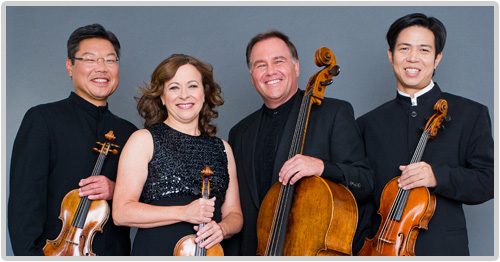By Daniel Hathaway
. Orpheus in Hades in Wooster, Meridian Bros in Hingetown, Miami Quartet (pictured) in Kent
. Almanac remembers Peggy Stuart Coolidge & Will Marion Cook
HAPPENING TODAY:
Today at 2, Ohio Light Opera descends into Hades with a matinee performance of Jacques Offenbach’s zany Orpheus in the Underworld in Wooster’s Freedlander Theatre. At 7:30, the Cleveland Museum of Art’s City Stages series visits a variety of Latin music in a Transformer Station performance by Meridian Brothers, a five-piece band “with a strong psychedelic and experimental sensibility.”
Also at 7:30, the Miami Quartet makes its annual appearance on the Kent Blossom faculty series in Ludwig Recital Hall at Kent State with works by Schubert, Mendelssohn & Dvořák.
Click here to visit the ClevelandClassical.com Concert Listings page for more information.
ALMANAC FOR JULY 19:
By Jarrett Hoffman

Peggy Stuart Coolidge, born on this date in 1913 in Swampscott, Massachusetts, is known for her distinctly American compositional voice influenced by popular and folk music.
Despite that, she’s better known abroad. Significant performances overseas during her lifetime included a 1967 concert of American music in Tokyo (she was also received by the Crown Prince of Japan) and, in 1970, a program presented in the Soviet Union that was devoted entirely to her music — a first for any American composer.
Coolidge studied with Quincy Porter at New England Conservatory, and Boston became an important musical hub for her. She had an especially strong relationship with The Boston Pops Orchestra, which premiered three of her orchestral works. Other Beantown activities included playing piano for hospitalized troops during World War II, serving as pianist and assistant conductor of the Women’s Symphony of Boston, and founding the Junior League Orchestra. (Plus, her scores are now held at the Harvard Library.)
Coolidge’s sonic interests were broad, extending to research in music psychotherapy, and composing background music for the children’s stories of her husband, who was a freelance writer. A larger collaboration with him began when the World Wildlife Fund requested that she write them a short musical theme, which later inspired her orchestra piece Blue Planet, to which he wrote narration.
An important milestone arrived in 1975, six years before her death, when the Westphalian Symphony Orchestra released American Reflections, one of the first recordings ever to consist entirely of music by a single American female composer. It included her Rhapsody for Harp and Orchestra, New England Autumn, Pioneer Dances, and Spirituals in Sunshine and Shadow.
Listen to the first movement of New England Autumn from that album here. And for a live performance, here’s the “Dance No. 1” from Pioneer Dances played by William Henry Curry and the Durham Symphony in 2019.

Classical music was his early focus: he studied violin at the Oberlin Conservatory, and at the Hochschule für Musik under Joseph Joachim, and later was a student of Antonin Dvořák at the National Conservatory of Music.
But Cook achieved most of his success as a composer of musical theater and popular songs. Important firsts in that arena included his In Dahomey (1903), which starred the iconic duo of George Walker and Bert Williams, and was the first full-length musical written and performed entirely by African Americans in a major Broadway theater. His The Southerners (1904) became the first Broadway show performed by a racially integrated cast.
Several of his songs are available on YouTube, as is the excellent Overture to In Dahomey, performed here by Rick Benjamin and The Paragon Ragtime Orchestra in a recording from the album Black Manhattan: Theater and Dance Music of James Reese Europe, Will Marion Cook, and Members of the Legendary Clef Club.
And speaking of the Clef Club (that Harlem-based society for African-American musicians that was particularly successful in the 1910s) — outside of theater, Cook’s podium credits included serving as chorus master and assistant conductor of the Clef Club Orchestra, in addition to founding what later became known as the Southern Syncopated Orchestra.
Looking back on this time before the advent of jazz, the development of that genre is often on the minds of scholars of the era. Musicologist Thomas Riis points out how Cook brought his harmonic skill and compositional sophistication into the world of popular music, “perhaps paving the way for the marriage of popular spirit and classical complexity which became jazz.”
Either way, he concludes, whether “as precursor to jazz or in its own right,” the music of Cook deserves a closer look.




